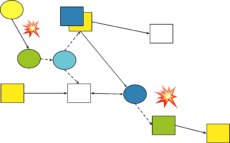If you can maintain and sustain your business’ ability to generate deep insights, integrate learning across groups, and disseminate and retain these lessons over time, you will evolve past your competitors.
But how effective are your teams at discovering these insights and making meaningful use of them beyond simple short-term “fixes”?
Just as all incidents are unique – so are organizations. Doing an assessment can reveal the existing sources of resilience as well as unknown sources of brittleness in your organization.
Research from the field of Resilience Engineering supports that these sources of resilience and brittleness are largely hidden from an organization’s internal view. Finding, exploring, and managing them requires expertise and skill with methods that trace, reveal, and map the cognitive processes of decision making.
Our team represents over 40 years of experience with these methods in high-tempo/high-consequence domains to improve processes, tooling, and practices.
Discovering and exploring hidden influences that incidents have
Incidents can have broad and significant influences on many business operations and decision-making. These influences are often not explicit or given much attention since they are perceived to be at a distance from where (in time and in the organization) these events happen.

Examples of where incidents have shown to wield influence include…
Medium/long-term business decisions
- Anticipation of future product/service problems
- Third-party vendor and partnership viability
- Engagement with external dependencies
- Leadership/management “philosophy” changes
- External stakeholder, shareholder, or investor expectancies
- Perceptions of risk by management which then bring adjustments to:
- Staffing and other budgeting forecasts
- Product roadmap coordination/priority
Velocity and robusness of change
- Agency/autonomy of practitioners “on the ground”
- Unintentional versus intentional org changes
- Local versus global adaptations in tech, practices, norms
- Regulation and compliance
- Introduction of new/novel tech or architectures
- Legacy migration and retirement
- Technical and “dark” debt
- Threats to esoteric but critical knowledge…
Typical Goals, Objectives, and Deliverables
The goals of an assessment are:
- To assess the organization’s current approaches to learning from incidents
- To identify opportunities for the org to improve those methods
- To recommend specific and actionable ways (practices, tooling, etc.) to deepen and broaden learning from incidents
The objectives of an assessment are:
- To trace and map the after-incident analyses and sharing processes that already exist in your organization
- To identify the existing sources of insight generation (tooling, practices, capturing esoteric knowledge, etc.) as well as the challenges to generating insights from after-incident analyses
- To identify current positive capacity, obstacles, and constraints on knowledge capture, take-up, and remembering of lessons learned
- To determine the types and range of productive insights that might be added
- To suggest approaches that the organization can use to obtain these insights
The deliverables of an assessment can include:
- Written summary (~20 pages for a medium-sized group) of the project findings and recommendations
- Presentation of the results with organization’s technical and managerial staff
- Bespoke workshop(s) targeted at developing incident analysis, debriefing facilitation skills, and/or other approaches related to human performance
- Written summary and/or recording of this workshop
(Deliverables obviously depend on the specific needs of the client and agreement of the engagement. These are just examples.)